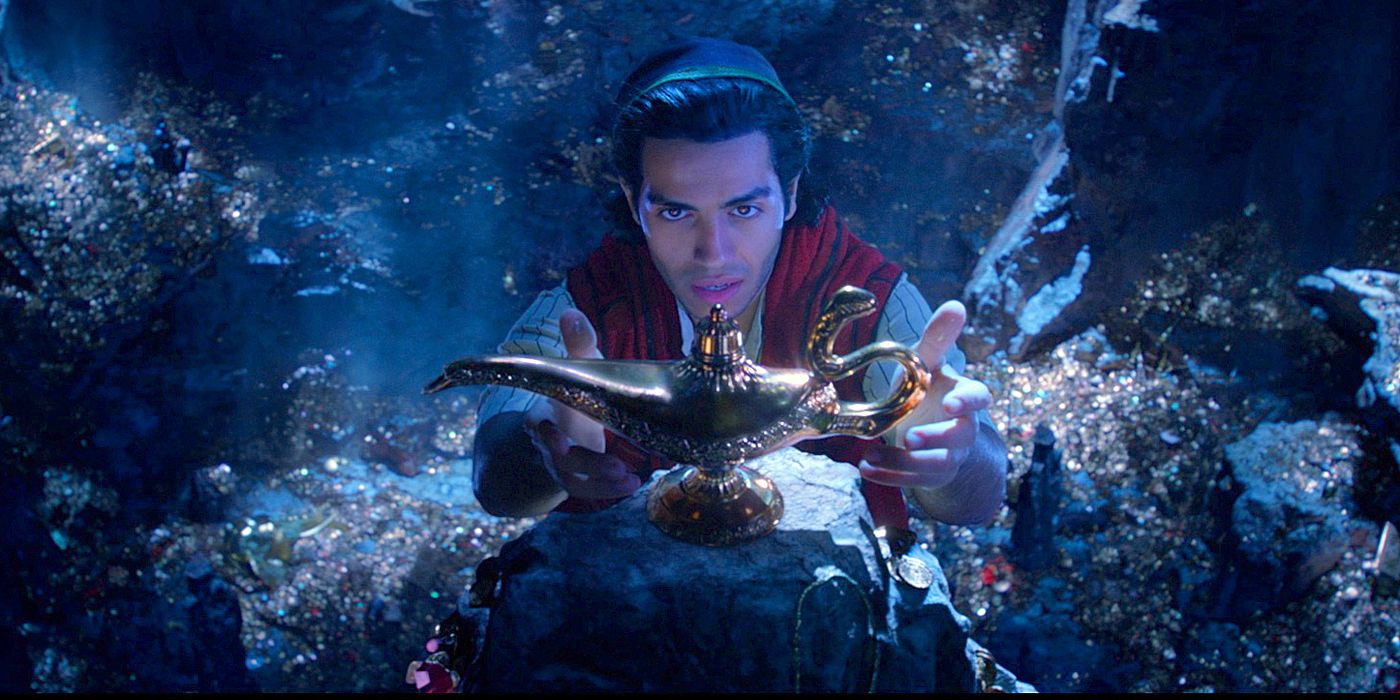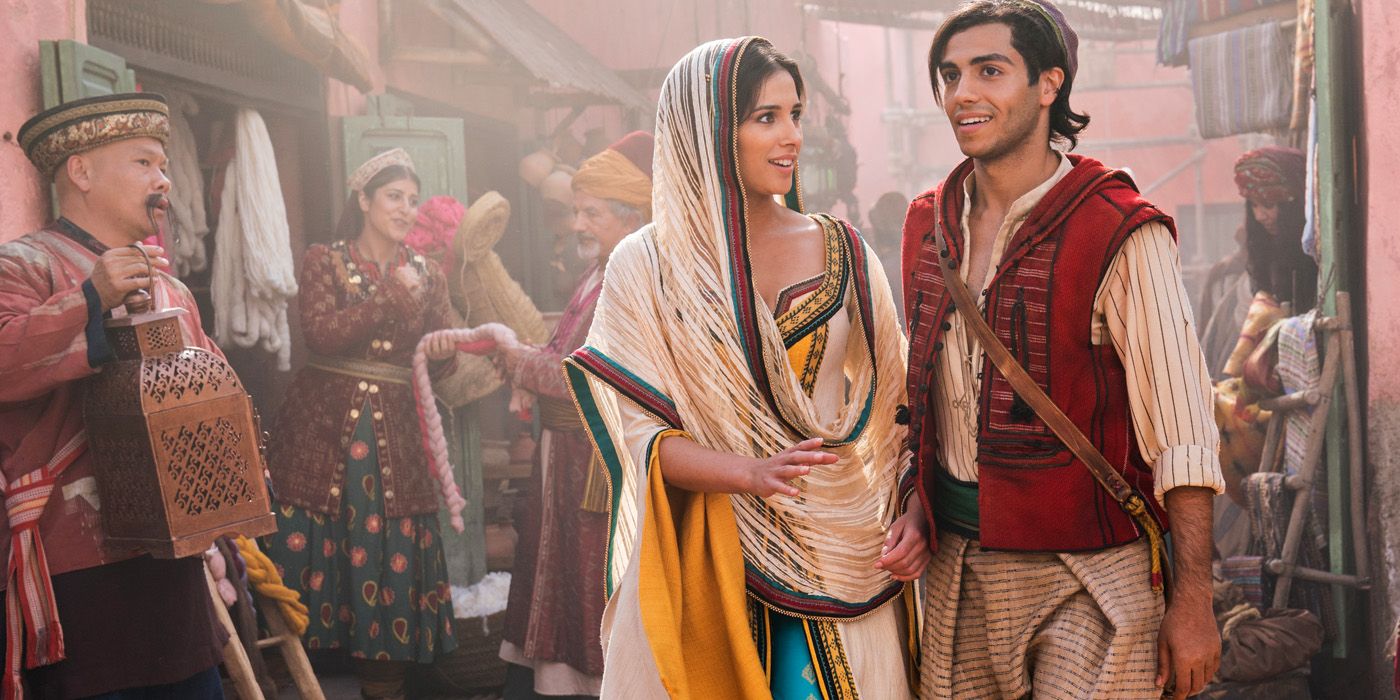Aladdin is probably Disney's most hotly anticipated live-action adaptation since the studio began remaking its animated classics in earnest with 2014's Maleficent. Beauty and the Beast carried a similar level of excitement, but Aladdin has more to live up to in terms of music and characters, what with the 1992 original boasting some of composer Alan Menken’s most dynamic work, and the improvisational genius of Robin Williams as Genie. Needless to say, nostalgic expectations were high for director Guy Ritchie's reinterpretation, and it’s nice to say that Aladdin surpasses them.
The film deftly avoids the trap live-action remakes before it have stumbled into in navigating the need to revive classic elements of the animated films (what’s the fun of a remake without them?), but also adding to the story to create something fresh. Often those supplements to Disney lore chafe more than they enhance (we didn’t need to know Belle’s mom died of plague), but in Aladdin, they serve to update the tale, as well as to provide backstory that fleshes out some characters in necessary, and entertaining, ways.
The particular stand-out in this case is Princess Jasmine, who is still the headstrong figure bored of palace life and who doesn’t want an arranged marriage, but flavored with a far more modern sensibility. Naomi Scott’s Jasmine refuses to accept that she needs to be married off when she firmly believes in her ability to rule Agrabah alone, despite her father clinging to the law in hopes of protecting his daughter. One of the new musical additions to Aladdin is her song, “Speechless,” an anthem to rival “Let It Go,” about her refusal to be silenced.
Jasmine’s updated storyline is, at least in part, an effort by Disney to capitalize on feminist culture that would’ve probably rejected a 2019 version of the original ending (Aladdin marries Jasmine and will presumably rule Agrabah after her father’s death, despite probably being illiterate). However, that doesn’t make it or Scott any less exciting to watch. You’ll walk out of the this movie far more interested in her future than you will in Aladdin’s, which is not to say that Mena Assoud’s performance isn’t charming. He’s just a little upstaged (OK, a lot).
Another backstory filled in for the better is that of the avaricious grand vizier Jafar, who's revealed to have been a thief like Aladdin before he broke out of poverty using far more questionable means. In this context, the character provides an interesting Mirror Universe counterpart to Aladdin, and raises the stakes when the street rat we’ve already grown to love begins to exhibit similar qualities. Despite that, Jafar is somehow the weakest Disney villain we’ve seen in ages. Marwan Kenzari (Ben-Hur, Murder on the Orient Express) is delightful to watch, but never comes close to the flamboyant smarminess of the original. The same goes for Iago, unfortunately. But let’s be honest, the real question is whether Will Smith accomplishes the impossible by following Robin Williams in one of the most iconic performances in Disney history. Survey says: He does, kind of!
Anyone who’s seen Aladdin and the direct-to-video 1994 sequel The Return of Jafar knows how much Robin Williams owned that role. Dan Castellaneta of The Simpsons fame, couldn’t come close to Williams’ magic as Genie. That performance needed decades for its influence to wane enough for audiences to accept anyone new in the role on this big a stage, and Smith is a comedic icon with a distinct enough flavor to be up to the task. He succeeds mostly because he doesn’t try to mimic Williams. His Genie isn’t as fast-paced or as absolutely bonkers, but that’s what serves Smith’s style, so it works for him.
The only problem is, he’s still singing the same songs and saying a lot of the same lines as Williams’ Genie, so even though he’s perfectly suited to recreate the role entirely, the script doesn't permit that, so it’s ultimately impossible not to compare him to the original. In those moments he feels listless instead of leisurely, aloof instead of cool. But for the most part, he slides into home with a performance that had the power to make or break the film.
But Aladdin succeeds most when it fully embraces its identity as a musical. The numbers are some of Menken’s most audacious, bombastic and exciting, and the film does them justice. You’ll no doubt be on the lookout for "Friend Like Me" and "Prince Ali," but don't sleep on "One Jump Ahead." Mena Massoud moves almost as fast as his cartoon counterpart, and there are a couple of fast-mo shots reminiscent of Ritchie’s very early work that feel just enough off-brand for Disney to be exciting.
As with all Disney classics, there’s much audiences hold dear, but Aladdin is more successful than most of the live-action remakes before it in not merely recreating the magic of the original, but reinvigorating it.
Directed by Guy Ritchie, Aladdin stars Mena Massoud as Aladdin, Will Smith as Genie, Naomi Scott as Princess Jasmine, Marwan Kenzari as Jafar, Navid Negahban as the Sultan of Agrabah, Billy Magnussen as new character Prince Anders, and Frank Welker and Alan Tudyk as the voices of Abu and Iago, respectively. The film opens Friday nationwide.


